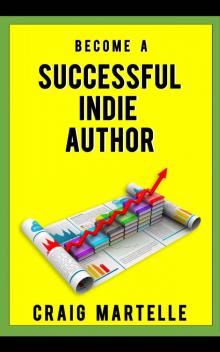 Become a Successful Indie Author
Become a Successful Indie Author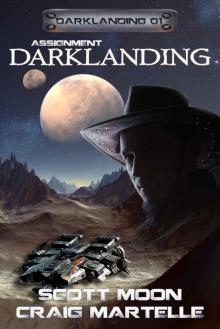 Assignment Darklanding
Assignment Darklanding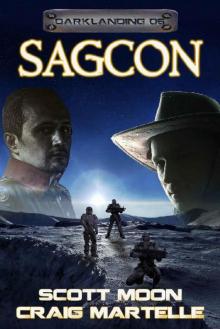 SAGCON
SAGCON Metamorphosis Alpha 2
Metamorphosis Alpha 2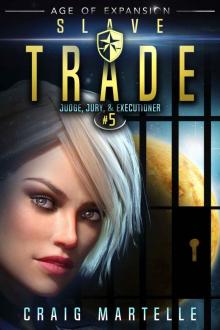 Slave Trade
Slave Trade Nomad Omnibus 03: A Kurtherian Gambit Series (A Terry Henry Walton Chronicles Omnibus)
Nomad Omnibus 03: A Kurtherian Gambit Series (A Terry Henry Walton Chronicles Omnibus) Nomad Omnibus 02: A Kurtherian Gambit Series (A Terry Henry Walton Chronicles Omnibus)
Nomad Omnibus 02: A Kurtherian Gambit Series (A Terry Henry Walton Chronicles Omnibus) Fratricide
Fratricide Judge, Jury, & Executioner Boxed Set
Judge, Jury, & Executioner Boxed Set Serial Killer: A Space Opera Adventure Legal Thriller (Judge, Jury, & Executioner Book 3)
Serial Killer: A Space Opera Adventure Legal Thriller (Judge, Jury, & Executioner Book 3) Destroyer: A Military Space Opera (The Bad Company Book 5)
Destroyer: A Military Space Opera (The Bad Company Book 5)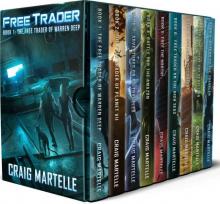 Free Trader Complete Omnibus
Free Trader Complete Omnibus Your Life Is Forfeit: A Space Opera Adventure Legal Thriller (Judge, Jury, & Executioner Book 4)
Your Life Is Forfeit: A Space Opera Adventure Legal Thriller (Judge, Jury, & Executioner Book 4) Dragon Invasion
Dragon Invasion The Expanding Universe
The Expanding Universe Race to the Finish
Race to the Finish Destroyer
Destroyer Discovery
Discovery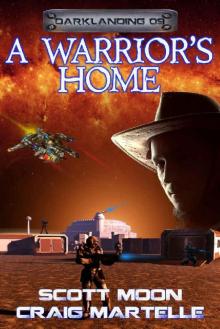 A Warrior's Home: Assignment Darklanding Book 09
A Warrior's Home: Assignment Darklanding Book 09 Nomad's Journal
Nomad's Journal Blockade: Age of Expansion - A Kurtherian Gambit Series (The Bad Company Book 2)
Blockade: Age of Expansion - A Kurtherian Gambit Series (The Bad Company Book 2) Cygnus Expanding: Humanity Fights for Freedom (Cygnus Space Opera Book 2)
Cygnus Expanding: Humanity Fights for Freedom (Cygnus Space Opera Book 2) Blockade
Blockade Nomad Omnibus 01_A Kurtherian Gambit Series
Nomad Omnibus 01_A Kurtherian Gambit Series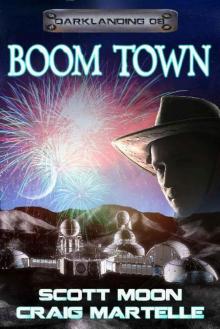 Boom Town
Boom Town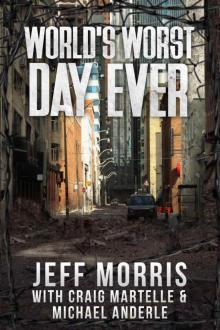 World's Worst Day Ever
World's Worst Day Ever Nomad's Journal_A Kurtherian Gambit Series
Nomad's Journal_A Kurtherian Gambit Series Endure (End Times Alaska Book 1)
Endure (End Times Alaska Book 1) Nomad's Fury: A Kurtherian Gambit Series (Terry Henry Walton Chronicles Book 5)
Nomad's Fury: A Kurtherian Gambit Series (Terry Henry Walton Chronicles Book 5) Cruiseliner Hades 7: A Lost 77 Worlds Tale
Cruiseliner Hades 7: A Lost 77 Worlds Tale The Bad Company
The Bad Company Nomad Avenged
Nomad Avenged Fury (End Times Alaska Book 4)
Fury (End Times Alaska Book 4) Nomad Mortis
Nomad Mortis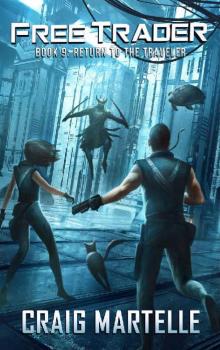 Return to the Traveler (Free Trader Series Book 9)
Return to the Traveler (Free Trader Series Book 9)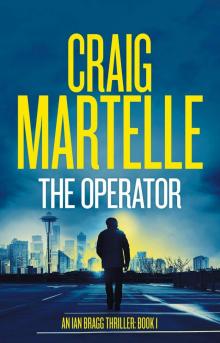 The Operator
The Operator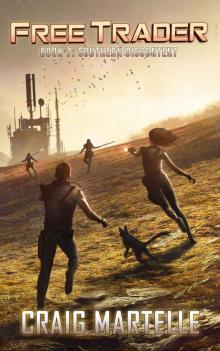 Southern Discontent
Southern Discontent Liberation: Age of Expansion - A Kurtherian Gambit Series (The Bad Company Book 4)
Liberation: Age of Expansion - A Kurtherian Gambit Series (The Bad Company Book 4) You Have Been Judged_A Space Opera Adventure Legal Thriller
You Have Been Judged_A Space Opera Adventure Legal Thriller Nomad's Galaxy
Nomad's Galaxy Nomad's Force: A Kurtherian Gambit Series (Terry Henry Walton Chronicles Book 9)
Nomad's Force: A Kurtherian Gambit Series (Terry Henry Walton Chronicles Book 9) Gateway To The Universe: In Bad Company
Gateway To The Universe: In Bad Company Nomad Supreme: A Kurtherian Gambit Series (Terry Henry Walton Chronicles Book 4)
Nomad Supreme: A Kurtherian Gambit Series (Terry Henry Walton Chronicles Book 4) Nomad Avenged: A Kurtherian Gambit Series (Terry Henry Walton Chronicles Book 7)
Nomad Avenged: A Kurtherian Gambit Series (Terry Henry Walton Chronicles Book 7) Nomad Redeemed: A Kurtherian Gambit Series (Terry Henry Walton Chronicles Book 2)
Nomad Redeemed: A Kurtherian Gambit Series (Terry Henry Walton Chronicles Book 2) You Have Been Judged
You Have Been Judged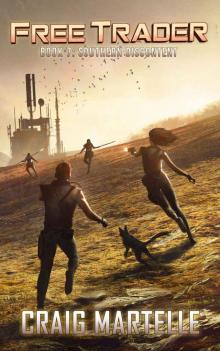 Southern Discontent (Free Trader Series Book 7)
Southern Discontent (Free Trader Series Book 7)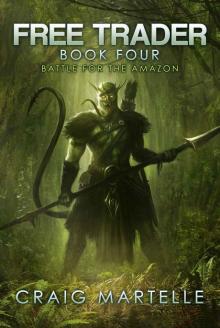 Battle for the Amazon (Free Trader Series Book 4)
Battle for the Amazon (Free Trader Series Book 4) Nomad's Galaxy: A Kurtherian Gambit Series (Terry Henry Walton Chronicles Book 10)
Nomad's Galaxy: A Kurtherian Gambit Series (Terry Henry Walton Chronicles Book 10) Nomad's Journal: A Kurtherian Gambit Series (Terry Henry Walton Chronicles)
Nomad's Journal: A Kurtherian Gambit Series (Terry Henry Walton Chronicles) Destroy The Corrupt: A Space Opera Adventure Legal Thriller (Judge, Jury, & Executioner Book 2)
Destroy The Corrupt: A Space Opera Adventure Legal Thriller (Judge, Jury, & Executioner Book 2)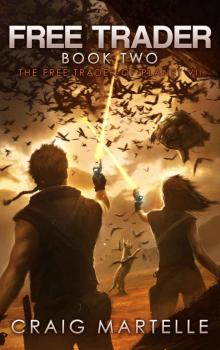 The Free Trader of Planet Vii
The Free Trader of Planet Vii Nomad Supreme
Nomad Supreme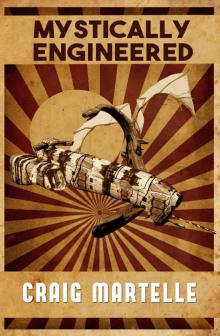 Mystically Engineered
Mystically Engineered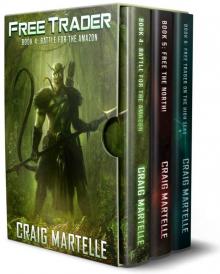 Free Trader Box Set - Books 4-6: Battle for the Amazon, Free the North!, Free Trader on the High Seas
Free Trader Box Set - Books 4-6: Battle for the Amazon, Free the North!, Free Trader on the High Seas Nomad Unleashed
Nomad Unleashed Nomad's Force
Nomad's Force The Great Cat Rebellion (Free Trader Series Book 8)
The Great Cat Rebellion (Free Trader Series Book 8) Nomad's Fury
Nomad's Fury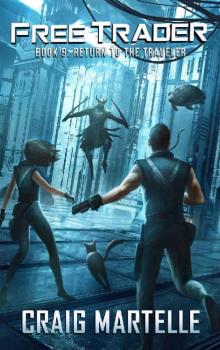 Return to the Traveler
Return to the Traveler Nomad's Justice
Nomad's Justice Nomad's Justice: A Kurtherian Gambit Series (Terry Henry Walton Chronicles Book 6)
Nomad's Justice: A Kurtherian Gambit Series (Terry Henry Walton Chronicles Book 6)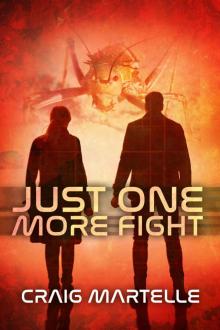 Just One More Fight
Just One More Fight Price of Freedom
Price of Freedom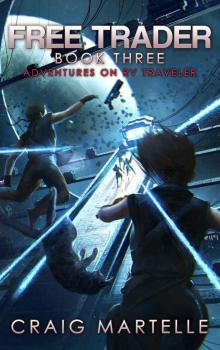 Adventures on RV Traveler (Free Trader Series Book 3)
Adventures on RV Traveler (Free Trader Series Book 3) Nomad Found
Nomad Found Liberation_Age of Expansion_A Kurtherian Gambit Series
Liberation_Age of Expansion_A Kurtherian Gambit Series Nomad Omnibus 01: A Kurtherian Gambit Series (A Terry Henry Walton Chronicles Omnibus)
Nomad Omnibus 01: A Kurtherian Gambit Series (A Terry Henry Walton Chronicles Omnibus) Run (End Times Alaska Book 2)
Run (End Times Alaska Book 2) The Free Trader of Warren Deep (Free Trader Series Book 1)
The Free Trader of Warren Deep (Free Trader Series Book 1) Cygnus Rising: Humanity Returns to Space (Cygnus Space Opera Book 1)
Cygnus Rising: Humanity Returns to Space (Cygnus Space Opera Book 1) You Have Been Judged: A Space Opera Adventure Legal Thriller (Judge, Jury, & Executioner Book 1)
You Have Been Judged: A Space Opera Adventure Legal Thriller (Judge, Jury, & Executioner Book 1) The Expanding Universe 4: Space Adventure, Alien Contact, & Military Science Fiction (Science Fiction Anthology)
The Expanding Universe 4: Space Adventure, Alien Contact, & Military Science Fiction (Science Fiction Anthology) Nomad Unleashed: A Kurtherian Gambit Series (Terry Henry Walton Chronicles Book 3)
Nomad Unleashed: A Kurtherian Gambit Series (Terry Henry Walton Chronicles Book 3) The Great Cat Rebellion
The Great Cat Rebellion Nomad Redeemed
Nomad Redeemed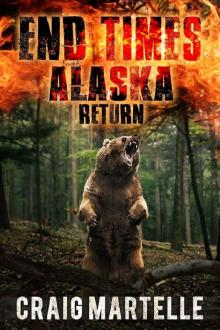 Return (End Times Alaska Book 3)
Return (End Times Alaska Book 3)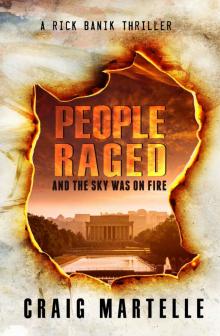 People Raged: and the Sky Was on Fire-Compendium (Rick Banik Thrillers Book 1)
People Raged: and the Sky Was on Fire-Compendium (Rick Banik Thrillers Book 1) Nomad Mortis: A Kurtherian Gambit Series (Terry Henry Walton Chronicles Book 8)
Nomad Mortis: A Kurtherian Gambit Series (Terry Henry Walton Chronicles Book 8) Nomad Found: A Kurtherian Gambit Series (Terry Henry Walton Chronicles Book 1)
Nomad Found: A Kurtherian Gambit Series (Terry Henry Walton Chronicles Book 1) Cygnus Arrives: Humanity Returns Home (Cygnus Space Opera Book 3)
Cygnus Arrives: Humanity Returns Home (Cygnus Space Opera Book 3)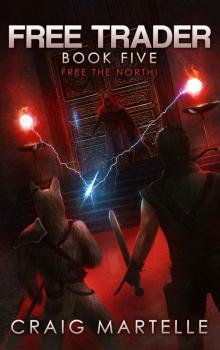 Free the North! (Free Trader Series Book 5)
Free the North! (Free Trader Series Book 5) Price of Freedom: Age of Expansion - A Kurtherian Gambit Series (The Bad Company Book 3)
Price of Freedom: Age of Expansion - A Kurtherian Gambit Series (The Bad Company Book 3) Become a Successful Indie Author
Become a Successful Indie Author Assignment Darklanding
Assignment Darklanding SAGCON
SAGCON Metamorphosis Alpha 2
Metamorphosis Alpha 2 Slave Trade
Slave Trade Nomad Omnibus 03: A Kurtherian Gambit Series (A Terry Henry Walton Chronicles Omnibus)
Nomad Omnibus 03: A Kurtherian Gambit Series (A Terry Henry Walton Chronicles Omnibus) Nomad Omnibus 02: A Kurtherian Gambit Series (A Terry Henry Walton Chronicles Omnibus)
Nomad Omnibus 02: A Kurtherian Gambit Series (A Terry Henry Walton Chronicles Omnibus) Fratricide
Fratricide Judge, Jury, & Executioner Boxed Set
Judge, Jury, & Executioner Boxed Set Serial Killer: A Space Opera Adventure Legal Thriller (Judge, Jury, & Executioner Book 3)
Serial Killer: A Space Opera Adventure Legal Thriller (Judge, Jury, & Executioner Book 3) Destroyer: A Military Space Opera (The Bad Company Book 5)
Destroyer: A Military Space Opera (The Bad Company Book 5) Free Trader Complete Omnibus
Free Trader Complete Omnibus Your Life Is Forfeit: A Space Opera Adventure Legal Thriller (Judge, Jury, & Executioner Book 4)
Your Life Is Forfeit: A Space Opera Adventure Legal Thriller (Judge, Jury, & Executioner Book 4) Dragon Invasion
Dragon Invasion The Expanding Universe
The Expanding Universe Race to the Finish
Race to the Finish Destroyer
Destroyer Discovery
Discovery A Warrior's Home: Assignment Darklanding Book 09
A Warrior's Home: Assignment Darklanding Book 09 Nomad's Journal
Nomad's Journal Blockade: Age of Expansion - A Kurtherian Gambit Series (The Bad Company Book 2)
Blockade: Age of Expansion - A Kurtherian Gambit Series (The Bad Company Book 2) Cygnus Expanding: Humanity Fights for Freedom (Cygnus Space Opera Book 2)
Cygnus Expanding: Humanity Fights for Freedom (Cygnus Space Opera Book 2) Blockade
Blockade Nomad Omnibus 01_A Kurtherian Gambit Series
Nomad Omnibus 01_A Kurtherian Gambit Series Boom Town
Boom Town World's Worst Day Ever
World's Worst Day Ever Nomad's Journal_A Kurtherian Gambit Series
Nomad's Journal_A Kurtherian Gambit Series Endure (End Times Alaska Book 1)
Endure (End Times Alaska Book 1) Nomad's Fury: A Kurtherian Gambit Series (Terry Henry Walton Chronicles Book 5)
Nomad's Fury: A Kurtherian Gambit Series (Terry Henry Walton Chronicles Book 5) Cruiseliner Hades 7: A Lost 77 Worlds Tale
Cruiseliner Hades 7: A Lost 77 Worlds Tale The Bad Company
The Bad Company Nomad Avenged
Nomad Avenged Fury (End Times Alaska Book 4)
Fury (End Times Alaska Book 4) Nomad Mortis
Nomad Mortis Return to the Traveler (Free Trader Series Book 9)
Return to the Traveler (Free Trader Series Book 9) The Operator
The Operator Southern Discontent
Southern Discontent Liberation: Age of Expansion - A Kurtherian Gambit Series (The Bad Company Book 4)
Liberation: Age of Expansion - A Kurtherian Gambit Series (The Bad Company Book 4) You Have Been Judged_A Space Opera Adventure Legal Thriller
You Have Been Judged_A Space Opera Adventure Legal Thriller Nomad's Galaxy
Nomad's Galaxy Nomad's Force: A Kurtherian Gambit Series (Terry Henry Walton Chronicles Book 9)
Nomad's Force: A Kurtherian Gambit Series (Terry Henry Walton Chronicles Book 9) Gateway To The Universe: In Bad Company
Gateway To The Universe: In Bad Company Nomad Supreme: A Kurtherian Gambit Series (Terry Henry Walton Chronicles Book 4)
Nomad Supreme: A Kurtherian Gambit Series (Terry Henry Walton Chronicles Book 4) Nomad Avenged: A Kurtherian Gambit Series (Terry Henry Walton Chronicles Book 7)
Nomad Avenged: A Kurtherian Gambit Series (Terry Henry Walton Chronicles Book 7) Nomad Redeemed: A Kurtherian Gambit Series (Terry Henry Walton Chronicles Book 2)
Nomad Redeemed: A Kurtherian Gambit Series (Terry Henry Walton Chronicles Book 2) You Have Been Judged
You Have Been Judged Southern Discontent (Free Trader Series Book 7)
Southern Discontent (Free Trader Series Book 7) Battle for the Amazon (Free Trader Series Book 4)
Battle for the Amazon (Free Trader Series Book 4) Nomad's Galaxy: A Kurtherian Gambit Series (Terry Henry Walton Chronicles Book 10)
Nomad's Galaxy: A Kurtherian Gambit Series (Terry Henry Walton Chronicles Book 10) Nomad's Journal: A Kurtherian Gambit Series (Terry Henry Walton Chronicles)
Nomad's Journal: A Kurtherian Gambit Series (Terry Henry Walton Chronicles) Destroy The Corrupt: A Space Opera Adventure Legal Thriller (Judge, Jury, & Executioner Book 2)
Destroy The Corrupt: A Space Opera Adventure Legal Thriller (Judge, Jury, & Executioner Book 2) The Free Trader of Planet Vii
The Free Trader of Planet Vii Nomad Supreme
Nomad Supreme Mystically Engineered
Mystically Engineered Free Trader Box Set - Books 4-6: Battle for the Amazon, Free the North!, Free Trader on the High Seas
Free Trader Box Set - Books 4-6: Battle for the Amazon, Free the North!, Free Trader on the High Seas Nomad Unleashed
Nomad Unleashed Nomad's Force
Nomad's Force The Great Cat Rebellion (Free Trader Series Book 8)
The Great Cat Rebellion (Free Trader Series Book 8) Nomad's Fury
Nomad's Fury Return to the Traveler
Return to the Traveler Nomad's Justice
Nomad's Justice Nomad's Justice: A Kurtherian Gambit Series (Terry Henry Walton Chronicles Book 6)
Nomad's Justice: A Kurtherian Gambit Series (Terry Henry Walton Chronicles Book 6) Just One More Fight
Just One More Fight Price of Freedom
Price of Freedom Adventures on RV Traveler (Free Trader Series Book 3)
Adventures on RV Traveler (Free Trader Series Book 3) Nomad Found
Nomad Found Liberation_Age of Expansion_A Kurtherian Gambit Series
Liberation_Age of Expansion_A Kurtherian Gambit Series Nomad Omnibus 01: A Kurtherian Gambit Series (A Terry Henry Walton Chronicles Omnibus)
Nomad Omnibus 01: A Kurtherian Gambit Series (A Terry Henry Walton Chronicles Omnibus) Run (End Times Alaska Book 2)
Run (End Times Alaska Book 2) The Free Trader of Warren Deep (Free Trader Series Book 1)
The Free Trader of Warren Deep (Free Trader Series Book 1) Cygnus Rising: Humanity Returns to Space (Cygnus Space Opera Book 1)
Cygnus Rising: Humanity Returns to Space (Cygnus Space Opera Book 1) You Have Been Judged: A Space Opera Adventure Legal Thriller (Judge, Jury, & Executioner Book 1)
You Have Been Judged: A Space Opera Adventure Legal Thriller (Judge, Jury, & Executioner Book 1) The Expanding Universe 4: Space Adventure, Alien Contact, & Military Science Fiction (Science Fiction Anthology)
The Expanding Universe 4: Space Adventure, Alien Contact, & Military Science Fiction (Science Fiction Anthology) Nomad Unleashed: A Kurtherian Gambit Series (Terry Henry Walton Chronicles Book 3)
Nomad Unleashed: A Kurtherian Gambit Series (Terry Henry Walton Chronicles Book 3) The Great Cat Rebellion
The Great Cat Rebellion Nomad Redeemed
Nomad Redeemed Return (End Times Alaska Book 3)
Return (End Times Alaska Book 3) People Raged: and the Sky Was on Fire-Compendium (Rick Banik Thrillers Book 1)
People Raged: and the Sky Was on Fire-Compendium (Rick Banik Thrillers Book 1) Nomad Mortis: A Kurtherian Gambit Series (Terry Henry Walton Chronicles Book 8)
Nomad Mortis: A Kurtherian Gambit Series (Terry Henry Walton Chronicles Book 8) Nomad Found: A Kurtherian Gambit Series (Terry Henry Walton Chronicles Book 1)
Nomad Found: A Kurtherian Gambit Series (Terry Henry Walton Chronicles Book 1) Cygnus Arrives: Humanity Returns Home (Cygnus Space Opera Book 3)
Cygnus Arrives: Humanity Returns Home (Cygnus Space Opera Book 3) Free the North! (Free Trader Series Book 5)
Free the North! (Free Trader Series Book 5) Price of Freedom: Age of Expansion - A Kurtherian Gambit Series (The Bad Company Book 3)
Price of Freedom: Age of Expansion - A Kurtherian Gambit Series (The Bad Company Book 3)